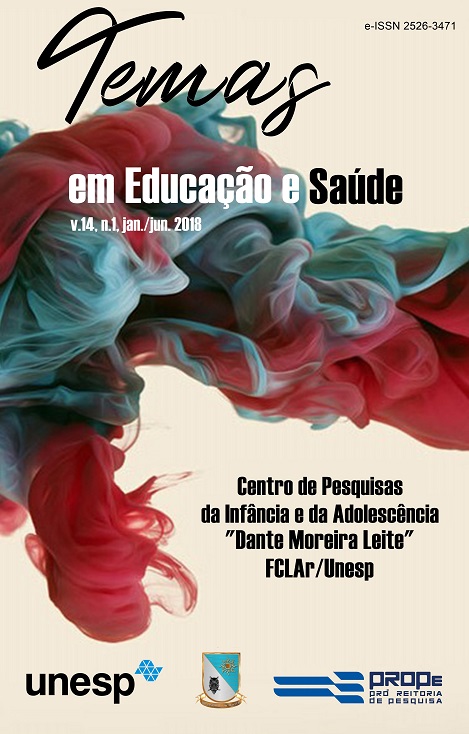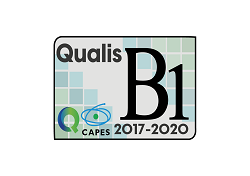The ages and stages questionnaires (asq-br) and collaborative actions among parents and educators
DOI:
https://doi.org/10.26673/rtes.v14.n1.2018.10581Keywords:
Monitoring, Child development, ASQ-BR, Child education, Family.Abstract
In Brazil, there is a lack of instruments for monitoring child development that subsidize Early Intervention. This, the Ages and Stages Questionnaires emerges as a possibility, since it allows the participation of parents and educators in the monitoring of child development. The purpose of this study was to verify the applicability of ASQ-BR by educators, as well as the involvement of parents in this process. To collect data, the ASQ-BR was used, a pre and post-test applied to the educators, a question guide to analyze their personal impressions and a field diary to follow the application of the instrument. The results revealed that educators have the skills to apply the ASQ-BR and that the instrument has allowed greater sharing of information on child development among parents and educators. The ASQ-BR points out potentialities in the context of early childhood education, since it is an instrument that allows monitoring the development.
Downloads
References
BARDIN, L. Análise de conteúdo. 3. reimp. Lisboa: Edições, v. 70, 2011.
DELLA BARBA, P. C. S.; RIZZO, I. C.; SERRANO, A. M. P. 2015. Ages and Stages Questionnaires, um sistema facilitador do envolvimento parental e do conhecimento do desenvolvimento infantil. Revista Portuguesa de Terapia da Fala (APTF), v. 4, p. 23-29, 2015. DOI: 10.21281/rptf.2015.04.04.
DELLA BARBA, P. C. S. O empoderamento de pais para o conhecimento sobre o desenvolvimento de seus filhos: o Ages and Stages Questionnaires Brasil – ASQ-BR. Relatório de Pesquisa CAPES (Pós-Doutorado em Estudos da Criança). Universidade do Minho, Braga, Portugal. 2014. Processo CAPES no. 10921/13-3
FILGUEIRAS, A.; PIRES, P.; MAISSONETTE, S.; FERNANDEZ, L. Psychometric Properties of the Brazilian-Adapted Version of the Ages and Stages Questionnaire in Public Child Daycare Centers. Early Human Development, 2013. DOI: 10.1016/j.earlhumdev.2013.02.005.
FIORAVANTI-BASTOS, A. C. M.; FILGUEIRAS, A.; MOURA, M. L. S. Avaliação do Ages and Stages Questionnaires-Brasil por profissionais de Educação Infantil. Estud. Psicol.,Campinas, v. 33, n. 2, p. 293-301, jun., 2016. DOI: 10.1590/1982-02752016000200011.
GRAÇA, P. R.; TEIXEIRA, M. L. S. C.; LOPES. S. C. G.; SERRANO, A. M. S. P. H.; CAMPOS, A. R. S. O momento da avaliação na intervenção precoce: o envolvimento da família estudo das qualidades psicométricas do ASQ-2 dos 30 aos 60 meses. Revista Brasileira de Educação Especial, Marília, v.16, n.2, p.177-196, maio/ago., 2010. DOI: 10.1590/S1413-65382010000200003.
PAPALIA, D. E.; OLDS, S. W.; FELDMAN, R. D. Desenvolvimento Cognitivo nos Três Primeiros Anos. In: PAPALIA, D. E.; OLDS, S. W.; FELDMAN, R. D. Desenvolvimento humano. Ed. Artmed, 8 ed. 2006. p. 186- 226.
REZENDE, M. A.; DA SILVA COSTA, P.; PONTES, P. B. Triagem de desenvolvimento neuropsicomotor em instituições de educação infantil segundo o teste de Denver II. Escola Anna Nery Revista de Enfermagem, v. 9, n. 3, p. 348-355, 2005.
DOI: 10.1590/S1414-81452005000300003.
SANTANA, C. M.T.; FILGUEIRAS, A.; LANDEIRA-FERNANDEZ, J. Ages & Stages Questionnaire–Brazil–2011 Adjustments on an Early Childhood Development Screening Measure. Global Pediatric Health, v. 2, p. 2333794X15610038, 2015. DOI: 10.1177/2333794X15610038.
Downloads
Published
How to Cite
Issue
Section
License
Os manuscritos aceitos e publicados são de propriedade da Temas em Educação e Saúde. Os artigos publicados e as referências citadas na Temas em Educação e Saúde são de inteira responsabilidade de seus autores. É vedada a tradução para outro idioma sem a autorização escrita do Editor ouvida a Comissão Editorial.







